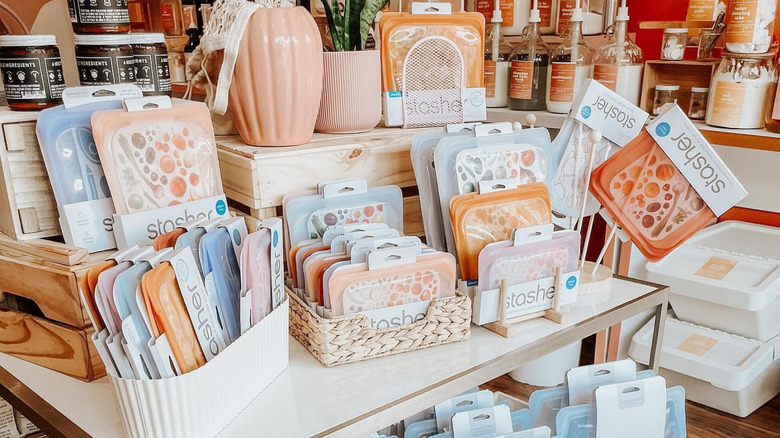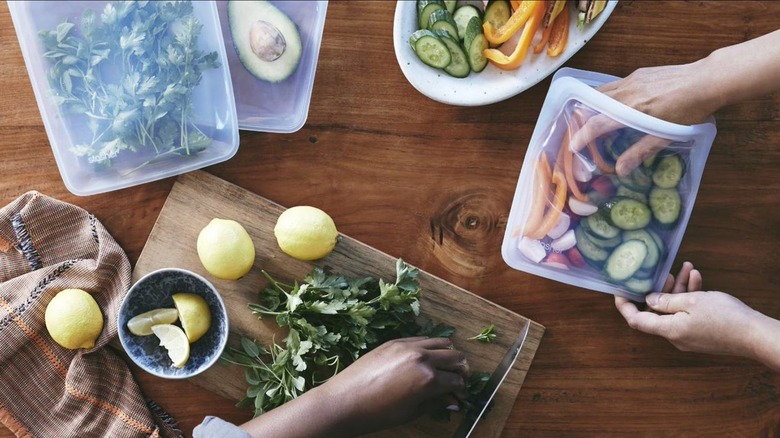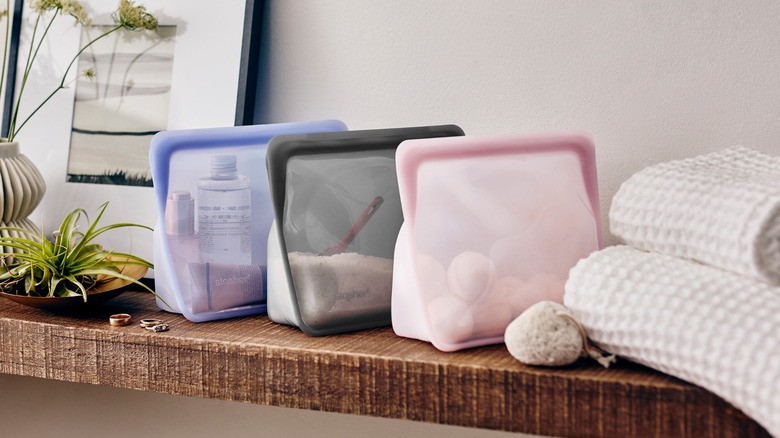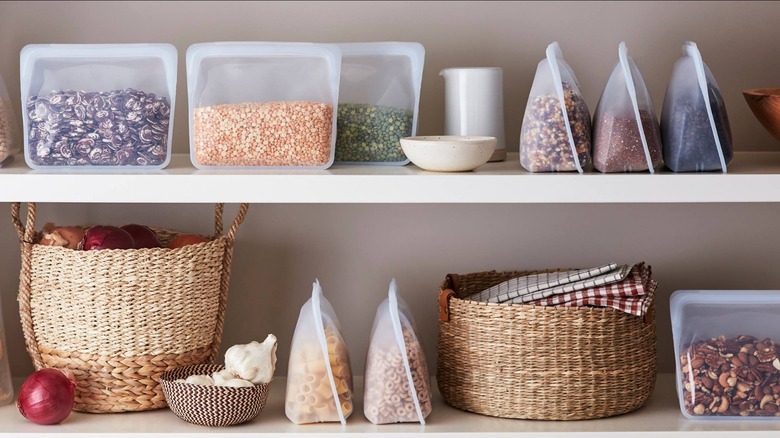Stasher: Here's What Happened After Shark Tank
The U.S. produced 4.20 million tons of waste in from plastic bags, wraps, and sacks in 2018 (per The United States Environmental Agency), of which less than a million was recycled. However, Statista found that 313.14 million Americans were still using storage bags made from plastic in 2020. Safe to say, plastic is among the most popular materials used for storage, but that is precisely what Kat Nouri hoped to change with her line of silicone storage bags called Stasher.
A resident of the San Francisco Bay Area, Nouri was not a first-time entrepreneur when she appeared on Season 9, Episode 15 of "Shark Tank" in 2018. She also ran Modern-Twist, which uses silicone as a textile to make furnishings such as placemats and table runners. The concept for Stasher came when Nouri noticed just how much single-use plastic she generated every day while packing lunches for her three kids. After finding only plastic-based storage options in the market, the idea struck: Why not turn the silicone that she used in Modern-Twist to make her own eco-friendly storage bags?
So in 2016, Nouri launched Stasher: a company that had $1.6 million worth of sales and $100,000 in profit when it appeared in the Tank. Nouri's goal was to reach $5.2 million by year-end in 2018 and, more ambitiously, turn Stasher into a $100 million company over the next four years. But for that, she needed the help of the Shark. Her ask? $400,000 in exchange for 5% of equity.
What happened to Stasher on Shark Tank?
Stasher's long-lasting silicone bags use a pinch-lock system that allows them to be squeezed and sealed the same way as resealable plastic alternatives, meaning they have the purity of glass but function like their plastic counterparts. To top it off, these bags are dishwasher, oven, and microwave-safe (unlike plastic), and can even be used for cooking in sous vide machines in place of Ziploc bags. They can be used for both hot and cold foods, can withstand heat up to 425 degrees Fahrenheit, and are freezer-friendly as well. Plus, they aren't just meant for storing food: Stasher's bags can even be used to pack things like toiletries and makeup.
However, the Sharks had their concerns. The bags were priced upwards of $9.99, which, despite their reusability, was on the more expensive end. They were also apprehensive about the lack of clear branding on the packaging, as it neither covered the company's story nor the bags' superiority over plastic alternatives to potential buyers.
Sharks Robert Herjavec and Barbara Corcoran were the first to back out. Though it seemed like there was a joint offer coming from Lori Greiner and guest Rohan Oza, they too were quickly put off when it became clear that Nouri had her eyes set on Mark Cuban. After a series of negotiations with Cuban, Nouri ultimately walked away with a deal — a $400,000 investment with another $400,000 line of credit for a 15% stake in the company.
Stasher after Shark Tank
Entrepreneurs may leave the Tank with an offer after shaking hands with a Shark, but it's rather common for deals to fall through once due diligence is done after the show. In fact, Forbes analyzed Seasons 8 through 13 to find that Cuban in particular — who will leave "Shark Tank" after its 16th season — only closed 54% of the deals that he made. One possible reason for this is that some entrepreneurs sign on for an appearance solely for publicity with no plans of following through with an offer. But for others, the terms of the deal change so remarkably off-screen that it is no longer viable. It turns out that was the case for Stasher.
Founder Kat Nouri confessed on the "How I Built This With Guy Raz" podcast that she spent around $20,000 to $25,000 negotiating with Cuban, but the deal ultimately fell through because she didn't agree with the terms. "I really wanted to make it happen," she said, explaining that, "I wanted a deal that basically let me still run the company the way I wanted to, and I couldn't get that deal, and I had to walk away."
The entrepreneur also didn't benefit from the boost of sales that many businesses see instantaneously after the episode airs. "It wasn't immediate, it kind of trickled through time," she said on the podcast, adding that her appearance on "Shark Tank" worked more as a marketing tool rather than a sales booster.
Is Stasher still in business?
The deal with Mark Cuban may have never materialized, but Kat Nouri powered on and Stasher is still very much in business — though its ownership has changed. Nouri later found her investor in a friend's brother who put up $500,000 while giving the entrepreneur full reign over how she ran the company. Armed with the funding and publicity from "Shark Tank," Nouri took her silicone storage bags to national retailers and partnered with Target (who had rejected her once before she appeared on the show) to stock them in 1,300 stores nationwide.
The entrepreneur also added more products, including smaller bags to pack snacks and store tinier items. Sturdier bags that hold their shape to stand upright were introduced, along with those that could be used to pack liquids.
Stasher grew from a team of nine to almost 40 people over the next year and was named the fastest-growing company in the Bay Area by the San Francisco Business Times in 2019. But, by then, it was time to take the silicone bags to greater heights.
In December 2019, Stasher announced that it was being acquired by SC Johnson — a $10 billion dollar company that owns several leading brands, including Ziploc and Glade. Speaking to Guy Raz about the motivation behind the sale, Nouri explained that she "wanted Stasher to be in the hands of everyone if it was gonna make real change, and it's all about distribution ... They [SC Johnson] are multinational!"
What's next for Stasher?
Since being acquired by SC Johnson, Stasher has grown exponentially. The silicone containers are sold in Whole Foods and on Amazon and, if all goes well, Stasher's retail presence will only expand. The company has now launched its own repurpose program wherein customers can ship old and damaged bags back to Stasher, and they will recycle them into things like track surfaces.
Stasher has also rolled out several charity-based initiatives: Containers are donated to schools and a portion of the company's sales go towards ocean-protection organizations. To date, Stasher has donated $1.3 million to these nonprofits — a figure that's likely to grow as Stasher scales in the years to come.
Considering its record, it's also likely that fans will see newer products. In fact, Stasher has even expanded its storage containers to introduce beauty bags made from silicone, as well as accessories such as drying racks and a cookbook under its banner.
But, while Stasher grows, its founder is no longer the CEO. Though Nouri is still the company's brand ambassador and continues to helm Modern-Twist, she told Guy Raz that she wished to take a step back to spend more time with her children. That said, it's not the end of the road for Nouri: She still aspires to have a positive impact on the world in some way. While Stasher did that by offering a sustainable alternative to single-use plastics, she hopes that her next venture will be even bigger.





